



FORGE FMINT24 Intercooler for VOLKSWAGEN Golf MK8 / AUDI S3 / CUPRA Formentor
This item is considered special order and is not available for immediate pickup or dispatch. Price and ETA may vary. Please note that no returns, cancellations, or refunds allowed on special orders.
FMINT24 is a performance intercooler for the MQB platforms with the EA888 GEN4 Engine. Produced, designed, and tested, at Forge's headquarters in Gloucester UK. Throughout the development process Forge has strived to improve the efficiency and performance of the EA888 GEN4 engine. The project brief was to develop an intercooler that utilised all of the available space in the original position of the OEM intercooler, and to ensure the inlet air temperature is reduced, without any negative effects on the boost pressure or engine and transmission cooling.
In the MQB chassis the intercooler housing is particularly restricted and confined to a small amount of space, due to it not only housing the intercooler, but also the radiator and air conditioning condenser. The front panel in theory is a sandwich pack that houses the auxiliary cooling components. This means in order to increase the size of the intercooler without paying detriment to the performance of the surrounding items, and with also having very little extra space available, that it can be very difficult to execute the perfect blend of a high flow intercooler within such a close proximity.
Forge R&D engineers started with the task of installing an existing intercooler that was for the MK7 platform to develop a VW MK8 Golf R. Once installed, they established whether the intercooler could be redesigned with larger inlet and outlet along with increasing production for the stream as well as increasing future design validation to ensure it works well with fine tuned Stage 3 and EA888 Gen 4 engines.
The design was created using scanning software and traditional measurement methods. This was then fine-tuned with flow dynamics (CFD) simulation programs and the end tanks were originally 3D printed. This allowed for a perfect fit on the vehicle even before the prototype castings or machined blank end tanks were ready for dyno testing.
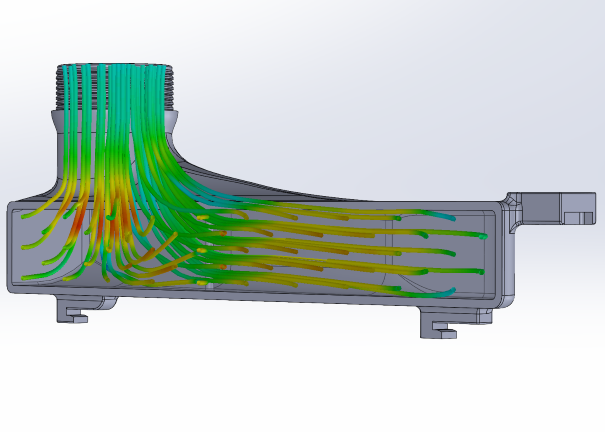
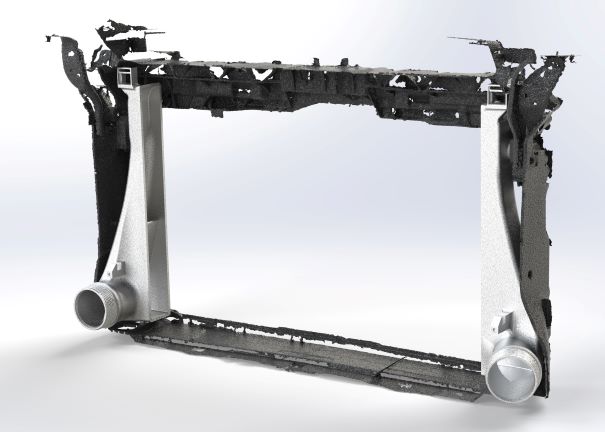
Several baffle configurations were designed, and flow simulated to ensure the maximum performance was obtained to keep the core working at its optimum, along with ensuring all its cooling capabilities had been upheld, and that the total volume of the core internal is utilised for optimum performance.
After increasing the size of the inlet and outlet ports, the company's engineers turned their attention to the design of silicone hoses. Thinking of flow, they created a step inside the hose where the hose meets the hot and cold sides. the transition between the inlet and outlet pipes is smooth, this helps to eliminate any obstruction to the airflow and prevent unwanted turbulence. To further aid with flow, the inlet and outlets have been increased to 76mm from the OEM size of 63mm which equates to a 45% increase in surface area.
Referring to space and smart design, our engineers manufactured several intercooler cores with different fin configurations and internal capacitance. Depending on the core design, test results led them to choose a rod and plate design that is 83% larger than the original intercooler, and with a frontal area increase of 10%.
Why are different cores being tested?
Here at Forge Motorsport, when developing an intercooler, being tested several different cores for each application. For example, a bar and plate style core, a tube and fin style core along with different fin pitches and heights, as well as changing the internal fin pitches/shapes and density within the tube; thus enabling to fine tune the amount of pressure drop the intercooler produces. Pressure drop is not always a bad thing, as testing and research has proven on various projects. This is because the pressurized air velocity is being stalled by the pressure drop within the cooler thus allowing more time to cool the air within the cooler itself, as air passes through the non-pressurized face of the core, that is open to the atmosphere.
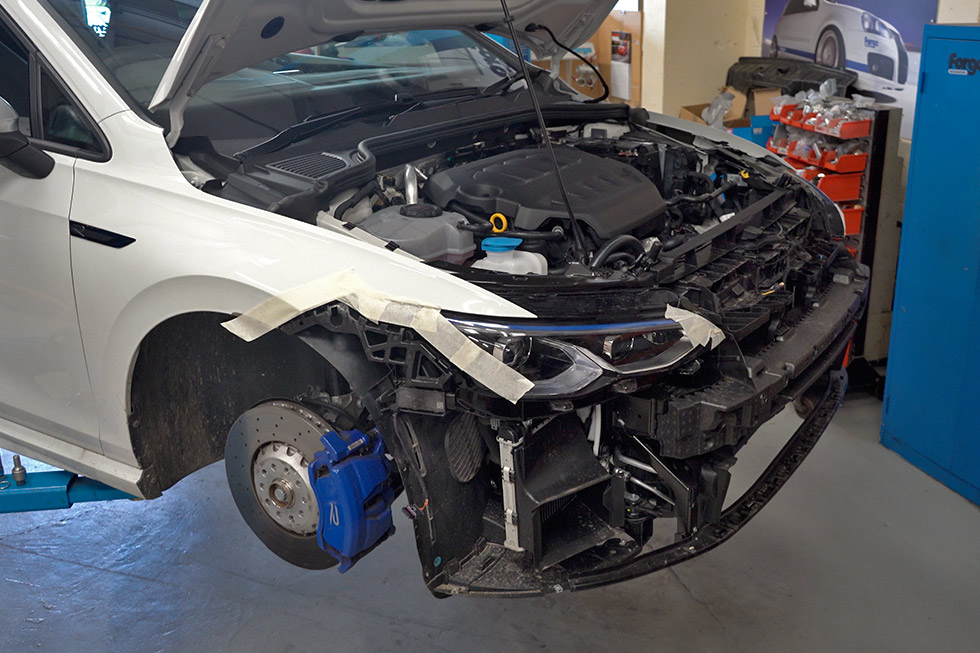
Too much pressure drop can of course have a problem on the higher performance engines as the intercooler reaches its maximum efficiency the turbo has to work a lot harder to force the air through the core. This in turn creates higher inlet air temps (IAT’s) due to the turbo creating more heat as it is over stressed and worked harder. No pressure drop can also prove to be inefficient as the cooler will not lower the charge temperature again resulting in higher inlet air temperatures.
Dyno Results
Testing was completed in Gloucester with their VTEC 4-wheel drive dynamometer. This was to ensure all data has been achieved with results as accurately as possible by an independent tuner. As you can see from the dyno results below, peak power was increased from stock by 11bhp and 20nm of torque at 5500RPM with the Forge Motorsport performance intercooler installed.
The best news is that there are significant torque gains throughout the rev range, meaning that the car power will pick up quicker and pull the whole way through to redline, including an impressive gain in BHP from 5000 RPM TO 6500 RPM. Gains on vehicles with re calibrated software and further hardware performance parts can be expected to be a lot higher due to the substantial drop in IATS when FMINT24 is installed.
During extensive testing, the company's engineers let the car warm up on the dyno until the radiator fans turned on and off (which gives an inlet temperature of around 40°C). They then made a dynamic analysis from that point, which gives a more stable result and more accurately reflects real driving conditions. You can easily see that the Forge intercooler cools much faster and provides a much larger temperature drop compared to the OEM.
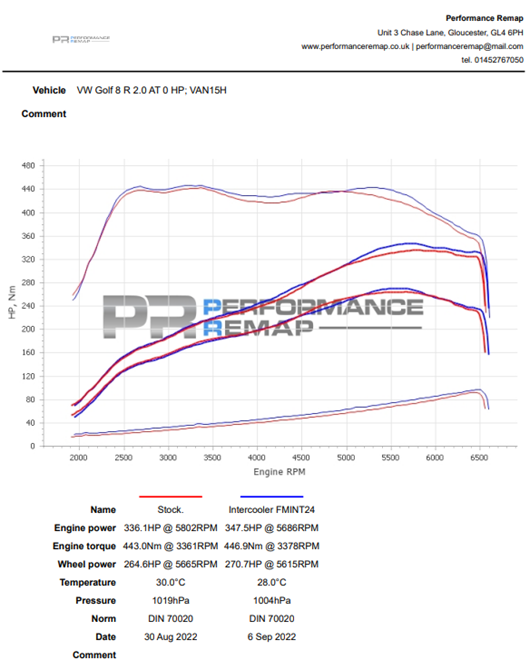
After more than six pulls on the dyno Forge still had super safe IAT’s, and the Forge Motorsport intercooler gave results of 34°C at 6548 RPM giving a reduction of 58% over the factory’s intercooler intake temps from 58°C at 6508 RPM. These tests took place in relatively hot conditions with an ambient dyno cell temperature of 23°C proving how inefficient the stock intercooler is.
In the summer months, the stock intercooler along with higher inlet air temperatures will have a hugely negative impact on the engine’s performance. In these conditions, the engine management will retard the ignition, resulting in a lower powered engine as temperatures rise and the ECU then pulls out the timing to stop detonation. On a mapped vehicle, the results will be even more detrimental and can lead to possible premature engine wear. If you use your car for fast road or have a high-performance tune in a hot climate, this product is essential.
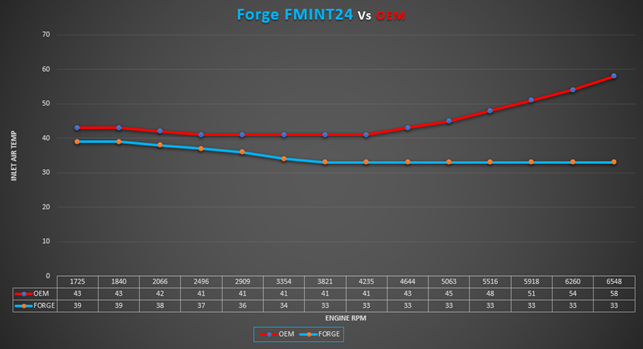
Why do Forge try to decrease IAT's? (Inlet Air Temperature)
Temperature and volume of air supplied to your vehicles engine that is compressed by the turbo charger has a better effect on performance when cool as this is to provide the engine with more oxygen (denser air), thus improving the combustion in each cylinder. In addition, by regulating and reducing the air temperature, it also increases the reliability of an engine by keeping the AFRs (Air Fuel Ratios) in each cylinder at a safe level, which in turn, can increase an engines power due to the air being cooler. A bigger bang is then created within the cylinder, providing the correct amount of fuel is added. This can equate to an increase in BHP and torque.
The Forge Motorsport intercooler is a perfect performance enhancing product that fits directly to the OEM mounting points, making for an easy install, in a relatively short period of time. No cutting of any components is needed, making the installation reversible if the vehicle needs to be returned to stock at any time in the future. The core and end tanks are finished in black textured anti corrosion coating that also aids with its thermal properties and keeps the product looking that bit stealthier or OEM+.
Forge Motorsport lifetime warranty on all hardware products shows that the company trusts the quality of its own products, as long as you are proud and happy with them.
